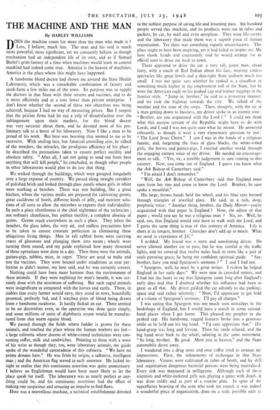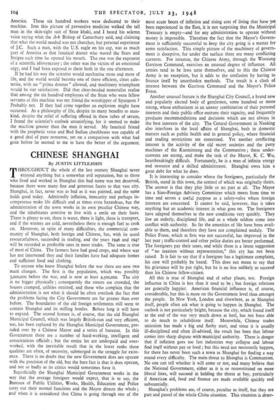THE MACHINE AND THE MAN
By HARLEY WILLIAMS
DOES the machine count for more than the man who made it ? Less, I believe, much less. The man and his soul is much more powerful, more significant, yet we constantly behave as though mechanism had an independent life of its own, and as if Samuel Butler's grim fantasy of a time when machines would learn to control mankind had indeed come true. America is the heaven of machines. America is the place where this might have happened.
A handsome blond doctor had shown me around the State Health Laboratory, which was a remarkable combination of factory and stock-farm a few miles out of the town. Its purpose was to supply the doctors in that State with their serums and vaccines, and to do it more efficiently and at a cost lower than private enterprise. I don't know whether the second of these two objectives was being achieved, because I had no way of measuring prices. But I suspect that the privIte firms had let out a yelp of dissatisfaction over the infringement upon their markets, for the blond doctor was very sarcastic about them, and he devoted most of his pre- liminary talk to a boost of his laboratory. Now I like a man to be proud of his work. But here was boasting that seemed to me to be excessive. With smiling face, but fanatical unsmiling eyes, he talked of the wonders, the miracles, the prodigious efficiency of his place ; he described the precautions taken to ensure perfect sterility and absolute safety. "After all, I am not going to send out from here anything that will kill people," he concluded, as though other people in other laboratories would plan to do just that thing.
We walked through the buildings, which were grouped irregularly over a large expanse of country. We passed along straight corridors of polished brick and looked through glass panels where girls in white were working at benches. There was one building, like a great kitchen, where the various media are prepared for cultivating germs, great cauldrons of broth, different kinds of jelly, and nutrient solu- tions of all sorts to allow the microbes to express their individuality. In such a place cleanlinesss is the chief nightmare of the technician ; not ordinary cleanliness, but perfect sterility, a complete absence of germs. Germs reach everywhere in such a place. They infest the benches, the glass tubes, the very air, and endless precautions have to be taken to ensure constant perfection in eliminating these ubiquitous living things. Men in tall rubber boots were carrying crates of glassware and plunging them into steam ; wheels were turning them round, and my guide explained how many thousand of these operations were done in a day. Then there were the animals, guinea-pigs, rabbits, mice, in cages. These are used to make and test the vaccines. They were housed under conditions as near per- fection as didn't matter, my host said, and he was certainly correct.
Nothing could have been more humane than the environment of these animals. If they were exploited for man's benefit, it was cer- tainly done with the minimum of suffering. But such caged animals were insignificant as compared with the horses and cattle. There, in stables that every farmer would envy, they stood in rows, beautifully groomed, perfectly fed, and I watched pints of blood being drawn from a handsome racehorse. It hardly flicked an ear. There seemed to be no discomfort even, as the operation was done quite simply, and some millions of units of diphtheria serum would be manufac- tured from that warm equine blood.
We passed through the fields where fodder is grown for these animals, and reached the place where the human workers are fed— a large cafeteria where dozens of white-coated technicians were con- suming coffee, milk and sandwiches. Pointing to them with a wave of his wrist as though they, too, were laboratory animals, my guide spoke of the wonderful camaraderie of this cafeteria. " We have no prima donnas here." He was Irish by origin, a talkative, intelligent man ; and the American flag waved in each sentence. He lacked in- sight to realise that this continuous assertion was quite unnecessary. I believe an Englishman would have been more likely to let the place speak for itself. The laboratory was as nearly perfect as any- thing could be, and his continuous assertions had the effect of making one suspicious and arousing an impulse to find flaws.
Here was a marvellous machine, a technical establishment devoted to the noblest purpose of saving life and lessening pain. Six hundred people served this machine, and its products went out in tubes and packeti, by car, by mail and even aeroplane. They were life-savers, and the laboratory that made them was a superb piece of human organisation. Yet there was something vaguely unsatisfactory. This place ought to have been inspiring, yet it had failed to inspire me. M) host shook hands and courteously said he would arrange for an official auto to drive me back to town.
There appeared to drive the car a very tall, gaunt man, about forty, with a touch of Red Indian about his face, wearing rimless spectacles like great jewels and a skin-tight State uniform much too small. I was not quite sure whether he ranked as a chauffeur or something much higher in the employment roll of the State, but he wore the American eagle on his peaked cap and leather leggings in the frontier style. " Jump in, brother," he said in a protective manner. and we took the highway towards the city. We talked of the weather and the state of the crops. Then, abruptly, with the air of a man getting down to business, my driver spoke in an intense tone: " Brother, are you acquainted with the Lord ? " I could not think what this austere servant of the Republic might have to do with Lords, and I said I was not quite sure what he meant. He answered tolerantly, as though it were a very elementary question to put : " The Lord Jesus Christ." I saw I was in the hands of a religious fanatic, and, forgetting the lines of glass blocks, the white-robed girls, the horses and guinea-pigs, I entered another world through the engaging earnest voice of my driver. He needed no encourage- ment to. talk. " Yes, sir, a terrible judgement is sure coming to this country. Now, you come out of England. I guess you know what the Ark Bishop of Canterbury said."
" I'm afraid I don't remember."
" Well, the Ark Bishop of Canterbury said that England must turn from her sins and come to know the Lord. Brother, he sure spoke a mouthful."
His large, brown hands held the wheel, and his blue eyes burned through triangles of jewelled glass. He said, in a rich, deep, prophetic voice : " Another thing, brother, the Daily Mirror—you're acquainted with that paper in England ? Now, the editor of that paper ; would you say he was a religious man ? No, sir. Well, he said, too, that England would sure have to walk with the Lord, and I guess the same thing is true of this country of America. Life is short at its longest, brother. Churches don't add up to much. What we need is experience of J.C."
I nodded. My friend was a stern and unrelenting driver. He never allowed another car to pass, but he was careful at the traffic lights, and we covered that twelve miles back to town like a pair of souls pursuing grace, he being my confident spiritual guide. " Say, brother, have you read Spurgeon's sermons ? " I said I had not.
" Spurgeon, well, he must be a great writer. I reckon he helped England in her early days." We were now in crowded streets, and I had not the heart to say that Spurgeon came long after England's early days and that I doubted whether his influence had been as great as all that. My driver guided the car.adroitly to the parking- space and said rather solemnly : " Now, I'd appreciate to get hold of a volume of Spurgeon's sermons. I'll pay all charges."
I was saying that Spurgeon was not much seen nowadays in the bookshops of England, but I would have a search in some second- hand places when I got home. This pleased my prophet in the peaked cap. His handsome, rugged features broke into a generous smile as he held out his big hand, " I'd sure appreciate that." His hand-grasp was long and fervent. Then his smile relaxed, and the big hand went back to the wheel, saluting in the same movement. " So long, brother. Be good. Meet you in heaven," and the State automobile drove away.
I wandered into a drug store and over coffee tried to arrange my impressions. First, the refinements of technique in that State laboratory. Viruses were cultivated in tubes of broth, and by skill and organisation dangerous bacterial poisons were being neutralised. Every risk was measured in milligrams. Although each of those scientists and white-jacketed girls was playing a game with death, it was done coldly and as part of a routine plan. In spite of the superfluous boasting of the man who took me round, it was indeed a wonderful piece of organisation, done on a scale possible only in America. Those six hundred workers were dedicated to their machine. Into this picture of preventive medicine walked the tall man in the skin-tight suit of State khaki, and I heard his solemn voice saying what the Ark Bishop of Canterbury said, and claiming that what the world needed was not churches, but personal experience of J.C. Such a man, with the U.S. eagle on his cap, was as much part of America as that fanatical doctor who waved the Stars and Stripes each time he opened his mouth. The one was the exponent of a scientific idiosyncrasy ; the other was the victim of an emotional orgy, and I had been exposed to them both in the one afternoon.
If he had his way the scientist would mechanise more and more of life, and the world would become one of these efficient, clean cafe- terias, with no " prima donnas " allowed, and machinery triumphant would be our satisfaction. Did that clear-headed materialist realise that among the six hundred employees of the State who were fellow servants of this machine was my friend the worshipper of Spurgeon ? Probably not. If they had come together an explosion might have occurred. As a philosophy of life, despite its many benefits to man- kind, despite the relief of suffering offered in these tubes of serum, I found the scientist's outlook unsatisfying, for it seemed to make the machine greater than the man it served. My fanatical friend with the prophetic voice and Red Indian cheekbones was capable of a good deal of pure nonsense, yet on a comparison with what had gone before he seemed to me to have the better of the argument.



































 Previous page
Previous page